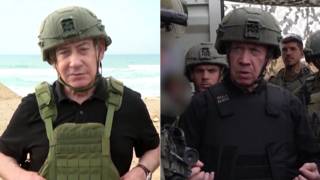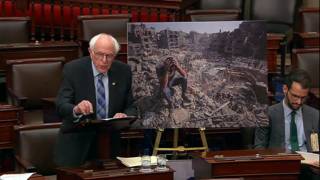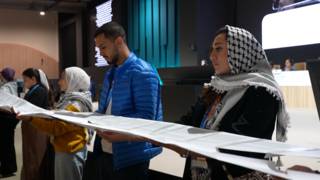
Related
Topics
Guests
- Scott RitterFormer Marine Corps Officer who served from 1991 to 1998 as a United Nations weapons inspector in Iraq in the United Nations Special Commission (UNSCOM). He is a registered Republican, and his most recent book is Waging Peace: The Art of War for the Antiwar Movement. His earlier books include Target Iran: The Truth About the White House’s Plans for Regime Change and Iraq Confidential: The Untold Story of the Intelligence Conspiracy to Undermine the UN and Overthrow Saddam Hussein.
In these last few months of the Bush administration, as we continue to discuss the war in Iraq and the possibility of an attack on Iran, we turn to a man who was a UN weapons inspector inside Iraq in the 1990s: Scott Ritter. We speak with Ritter about Iran, Joe Biden’s role in the lead-up to the Iraq invasion and much more. Despite being a registered Republican, Ritter is backing Barack Obama. [includes rush transcript]
Transcript
AMY GOODMAN: President Bush praised Arizona Senator John McCain Tuesday for his commitment to the surge in Iraq and described him as a man who “would rather lose an election than see his country lose a war.”
In these last few months of the Bush administration, as we continue to discuss the war in Iraq and the possibility of an attack on Iran, we turn to a man who was a UN weapons inspector inside Iraq in the ’90s. I’m talking about Scott Ritter. He resigned as chief weapons inspector for the United Nations in 1998 and became an outspoken critic of sanctions in Iraq and US interference in weapons inspection programs.
Scott Ritter’s recent articles have focused on Iran. His latest piece on Iran, published earlier this summer on <a href=http://www.truthdig.com/report/item/20080729_acts_of_war/ >Truthdig.com, is called “Acts of War.” It begins with the lines: “The war between the United States and Iran is on. American taxpayer dollars are being used, with the permission of Congress, to fund activities that result in Iranians being killed and wounded, and Iranian property destroyed. This wanton violation of a nation’s sovereignty would not be tolerated if the tables were turned and Americans were being subjected to Iranian-funded covert actions that took the lives of Americans, on American soil, and destroyed American property and livelihood.” Those are his words.
Scott Ritter is also a registered Republican and is here in St. Paul during the Republican National Convention.
Welcome to Democracy Now!
SCOTT RITTER: Not as a delegate.
AMY GOODMAN: Not as a delegate. You’re outside the convention.
SCOTT RITTER: So to speak.
AMY GOODMAN: Well, why are you here?
SCOTT RITTER: Well, first of all, I’ve been invited. I’ve been invited by various groups, concerned citizens who want to talk about the issues of war, the issues of, you know, the future, the military. One of the first groups that I spoke with were Veterans for Peace, Iraq Veterans Against the War. They had a — they had their annual gathering here. It was a thrill and a privilege to — and you were there, as well — to be with these men and women who have served their country so proudly and who have expressed their dismay over the policies of the United States of America. And I was honored to be in their company.
AMY GOODMAN: And what about in the company of, well, thousands of Republican delegates who are here in St. Paul? You are a Republican. How have you seen your party change?
SCOTT RITTER: Well, I’m a registered Republican, but like most Americans, if we’re honest, I can’t claim to have been born into, you know, being a political person. You turn eighteen, you register to vote, you pick a party. My father was career military. I picked the Republican Party, because of the reputation that it had for being the party of national defense. This was the time of the Cold War. We were stationed overseas, and the military was an all-consuming reality.
I’ve retained my Republican registration, but what I’ve found as I’ve grown politically is that rather than identify myself as a Republican or an anti-Democrat, I’ve come to identify myself as an American. An American, first and foremost. And I’ve warned the Republicans — I’ve done this in Congress, I’ve done this when I speak to them — that this war in Iraq — and I said this before we invaded — will destroy the Republican Party. And it has.
Here in Minnesota, watching the Republican National Convention convene, watching what occurred yesterday, wasn’t a celebration of patriotism. Yesterday was a celebration of a unilateralist vision of an America that has lost track, that has deviated from the course of ideals and values that are set forth in the Constitution, a Constitution, by the way, these men and women who served in the military took an oath to uphold and defend with their lives, a constitution that our political leadership has done the same. How can one claim to be a proud American and watch what occurred in St. Paul yesterday, this wanton abuse of the term “patriotism”?
AMY GOODMAN: What do you mean?
SCOTT RITTER: Again, they hijack it. If you’re not in support of the war, you’re not patriotic. If you’re not in support of holding Iran to account in accordance with the terms set forth by the Republican Party, you’re not a patriot. If you’re not in support of defining America along the terms that the Republican Party, in its very narrow-minded manner, seeks to define America, you’re not a patriot.
You know, America is bigger than the Republican Party, and I think the Republicans might find this out this coming election, that there are people out there that aren’t going to automatically vote Republican on the ballot, not only because they believe in something else, but because it’s hard to see what the Republicans believe in today that can be legitimately aligned with the values and ideals of this great nation.
AMY GOODMAN: I want to turn to our two leading presidential candidates and their recent statements on Iran. This is Senator Obama talking about Iran at a rally in Iowa last week.
SEN. BARACK OBAMA: My job as president would be to try to make sure that we are tightening the screws diplomatically on Iran, that we mobilize the world community to go after Iran’s nuclear program in a serious way, to get sanctions in place so that Iran starts making a different calculation. And we’ve got to do that before Israel feels like its back is to the wall.
AMY GOODMAN: And this is Senator McCain discussing Iran while on the campaign trail in July.
SEN. JOHN McCAIN: It’s time for action, and it’s time to make the Iranians understand that this kind of violation of international treaties, this kind of threatening of their neighbors, this kind of continued military activity is not without cost.
AMY GOODMAN: Scott Ritter, “not without cost”? John McCain, Barack Obama — are their policies different?
SCOTT RITTER: Well, on the issue of Iran, I guess we can see clearly that there isn’t much that separates the two. And this is disturbing, because what we have in this time of, you know, national dialogue — because that’s what a presidential election should really be about. It’s about national dialogue. It’s about 300 million people making a decision on what kind of leadership they want for the next four years. And there are many critical issues. We don’t need to enunciate all of the domestic issues that are being ignored while we’re focused on issues like Iran. But when we speak of executive leadership, one of the main tasks given our president is national security. And so, it’s very good that we have these two candidates focused on the national security of the United States, but the way that they have couched Iran is a way that only points towards confrontation.
AMY GOODMAN: Tell us what you mean when you say the war is already on, this isn’t a matter of whether or not we go to war with Iran.
SCOTT RITTER: Well, again, war is defined as — in a number of ways. As a former Marine, I can tell you that an act of war would be, for instance, if I locked on a target acquisition radar onto to another airplane. Just by locking on a radar, which indicates my willingness to target them, is an act of war, even though I don’t fire on them. If a nation violates the sovereign airspace, one is allowed to assume the intent is nefarious and allow for the self defense to shoot down that aircraft. If somebody violates your territory with weaponry, with explosives, and carries out acts which manifest themselves in death and destruction, it’s an act of war.
The United States has authorized this kind of activity in Iran, either directly through American-controlled assets or by proxy, using assets which are managed by either the Department of Defense or the Central Intelligence Agency. The United States Congress has passed resolutions using taxpayer money for the purpose of removing the regime in Iran from power.
I don’t know how other people want to stack all this up, but when I take a look —- again, if you erase “Iran” and put “the United States,” and this was happening to us, at this convention, there would be screaming that America is under attack, that we are being subjected to war, and we have every right to defend ourselves. So I would say that it’s only fair that if America is subjecting another nation to this, that we are committing acts of war against that nation. It may not be the conventional war that people are accustomed to, where troops in identified uniforms are moving forward, but it’s definitely a precursor to conventional war. We are preparing the battlefield for the kind of decisive confrontation that both Barack Obama and John McCain are speaking about.
I mean, I don’t know who they think they’re fooling. But when Barack Obama says that we need to confront Iran, what does he mean by this? Sanctions? Sanctions is not a policy. The history of sanctions shows that sanctions is the antithesis of policy. You employ sanctions when you don’t have sound policy. And sanctions hardly ever reverse trends. Sanctions are a holding action designed to contain and destabilize until which time you can align the forces necessary to complete the task. And the task is regime change.
AMY GOODMAN: Barack Obama has also said he would unilaterally attack Pakistan, and one of the top headlines today is that the US is being accused of leading a ground assault that killed at least fifteen people. If confirmed, it would mark the first time that the US has used ground troops inside Pakistan. The raid is said to have involved US helicopters based in Afghanistan. The governor of Pakistan’s North West Frontier Province called the attack an “outrageous” assault on Pakistan’s sovereignty. How would you link Pakistan and Iran in our policy with them?
SCOTT RITTER: Pakistan is a problem set that’s derived from the events of September 11th. We have an individual, Osama bin Laden, and an organization, al-Qaeda, which continues to operate out of Pakistani soil. And there’s -—
AMY GOODMAN: By the way, one of the T-shirts being sold at the Republican convention says “Obama bin Biden.”
SCOTT RITTER: It’s just the kind of ignorance that just disturbs me, and I don’t understand why people even think that’s funny. You can have differences with Barack Obama. I have extreme differences with Barack Obama on a number of issues, but I will never discredit his American citizenship or his right to his views. And just because he comes from a lineage that is diverse, which is wonderful in these United States of America, to have a diverse, you know, background representing — being the potential to be this leader — it’s just disturbing that people who call themselves patriots, people who call themselves Americans, would even sink to that level. But a separate issue.
Pakistan is basically a byproduct of the global war on terror and basically the fact that the Bush administration has not been able to complete the mission that they set out when they invaded and occupied Afghanistan. The purpose wasn’t to invade and occupy Afghanistan. The purpose was to bring to grips, to bring into custody, to eliminate, Osama bin Laden and al-Qaeda. We have not been able to do so. And so, now we see, in our frustration, we’re violating the sovereignty of yet another nation. So, in the global war on terror, which is supposed to be about defending the rule of law, we are violating international law on a regular basis.
Iran is a different problem set. Iran is about global hegemony. Iran is about the United States implementing a strategic vision that was first defined in the September 2002 National Security Strategy, dividing the world into spheres of special interests, imposing our will on them, etc.
So there’s two different policies wrapped into one, though, unifying concept, which is exploiting the ignorance of the American people about the Islamic world. You see, even though Pakistan and Iran are two separate nations, for the majority of Americans, the way the Republicans sell this, they’re just Muslims. And as you saw — as I saw you in your lead-up with the Al-Arian story, America’s ignorance about the Islamic faith, about people who practice the Islamic faith, is continuously exploited by people who have ulterior motives.
And I think we need to get to the bottom of both, what’s really going on in Afganistan, Pakistan and Iran, but we can’t do that unless we have a respect for the people who populate that nation. If we dismiss them simply by saying they’re all Muslims, that means that we’re not really trying to define the problem. And if you don’t define the problem, how can you ever come up with a solution to the problem? And Barack Obama is as guilty of this as is John McCain.
AMY GOODMAN: Steve Ritter, I interviewed pro-war veteran Lieutenant Colonel Steve Russell on Monday on Democracy Now! He founded the group Vets for Victory. He’s also on the board of Vets for Freedom. This is what he said about weapons of mass destruction in Iraq.
STEVE RUSSELL: If you look at the testimony of Dr. Ahmed Obeidi, who was Saddam’s nuclear physicist, he had a Zippe centrifuge in hand. This was a Western-manufactured centrifuge. Centrifuge, it refines uranium, in simple terms. Only a handful of nations have acquired this Western-made technology. Let me name a few of them: Israel, Pakistan, North Korea. You look at these nations, they have one thing in common: they all developed the bomb. They had this technology in hand. Now, what they didn’t have was the complete oversight or lack of oversight to develop their nuclear weapons program. We found yellowcake. We have a Zippe centrifuge there. No other nation left to themselves was not able to develop the bomb with the Zippe centrifuge in hand.
AMY GOODMAN: Retired Lieutenant Colonel Steve Russell.
SCOTT RITTER: Well, I respect Colonel Russell’s service to his country. What I don’t understand is why Steve Russell feels that he’s empowered to talk about weapons inspections in Iraq. I sort of was deeply involved in that program from ’91 to ’98. His name never appeared on any of the inspector rosters. He wasn’t there as an inspector, and because he wasn’t, he has gotten some of the issues wrong. I wouldn’t quote Mahdi Obeidi in a positive way. And anyway, that just shows how ideologically motivated this guy is.
The Zippe centrifuge, it’s Dutch-designed. So there’s another nation that has it that doesn’t have a nuclear weapons program. The same technology has been used by Germany to enrich uranium. They don’t have a nuclear weapons program. The Japanese use it; they don’t have a nuclear weapons program. The Canadian — my point is, many nations use centrifuges to enrich uranium. It is one of the most cost-effective means of enriching uranium for nuclear energy. Nations have used this technology in an illicit fashion: Israel, Pakistan, maybe North Korea — we’re not quite sure about that, because we don’t know if they have a uranium enrichment program or not. But we do know that Iraq acquired this technology. They never perfected it. The Iranians are using a derivative — the P1 centrifuge is a Zippe derivative —- to enrich uranium.
But he misses the point, because he speaks of international law, operating outside the framework of international law. To say Israel and Pakistan, he’s right. North Korea is a signatory to the Nuclear Non-Proliferation Treaty, and they only went forward on their nuclear program after they withdrew from it. Iran is a signatory. And the key aspect of Steve Russell’s comment is outside the framework of international monitoring. Iran is 100 percent monitored by the International Atomic Energy Agency, and they have a complete understanding of the scale and scope of Iran’s centrifuge program, a complete accounting of the totality of Iran’s nuclear material. So I don’t know what Steve Russell is trying to do, to link Iraq, which he does so inaccurately, with the situation in Iran, but he’s off base.
AMY GOODMAN: Scott Ritter, you were in Naval intelligence. You served under -—
SCOTT RITTER: Marine intelligence.
AMY GOODMAN: Marine intelligence. You served under General Schwarzkopf?
SCOTT RITTER: Yes, ma’am.
AMY GOODMAN: What’s the last fifteen seconds you want to leave our listeners and viewers with? What do you think is the most important thing to understand today on this eve if the 2008 election?
SCOTT RITTER: Fifteen seconds? Iran poses no threat to the United States of America worthy of military intervention, and we should ensure that our political leadership, before they send our troops to war, as Barack Obama says he may do, or take care of them when they come home, that we exhaust all means short of war before we go to war, that we make sure war is the last option. Right now we hear too much warlike rhetoric about standing tall. Don’t stand tall; stand safe.
AMY GOODMAN: Former UN weapons inspector, Scott Ritter, here in St. Paul.












Media Options